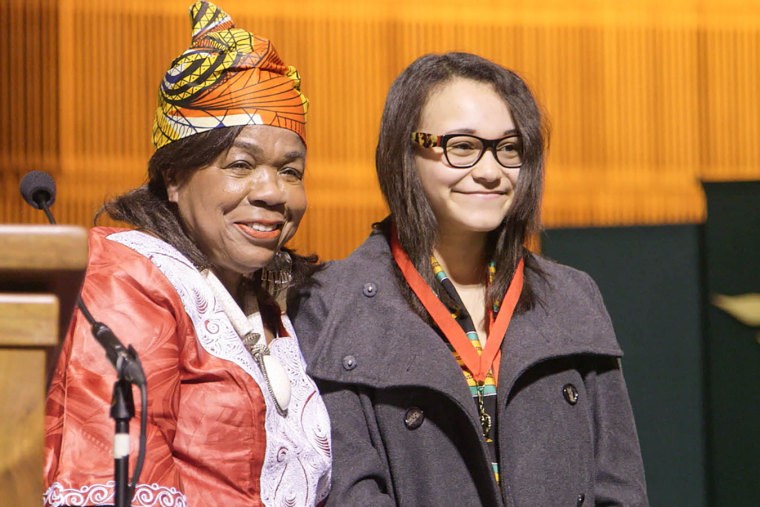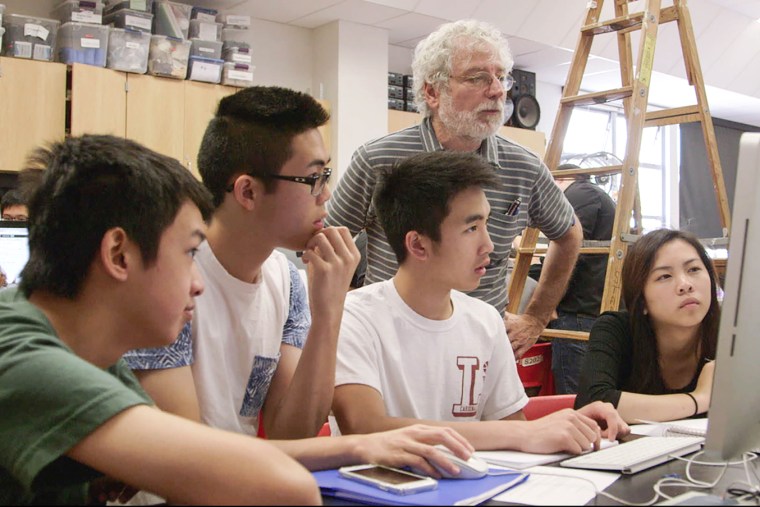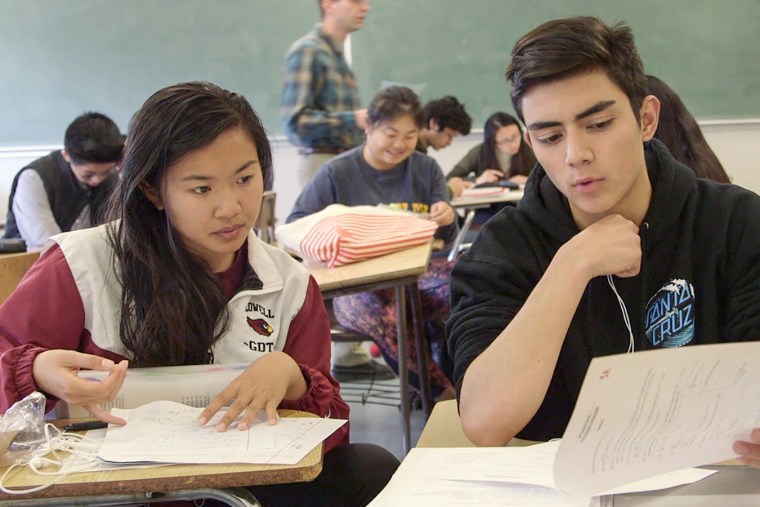In a documentary on San Francisco’s arduous Lowell Superior University, an Asian American college student chastises his mother for indicating that his father never ever completed higher college.
“Don’t say that,” then-senior Alvan Cai states in Mandarin to his mom, Capri, off-digital camera just before speaking to the filmmakers. “I really do not want men and women to believe lowly of my dad or anything.”
Although Asian Individuals who attempt for leading-tier colleges are stereotyped as getting from wealthy, educated family members, the truth a lot more usually resembles stories like Cai’s: young children of operating-class immigrants who seize on to the thought of better education as a automobile for balance in the U.S.
It’s these learners whom director Debbie Lum reported she hoped to humanize in her documentary, “Try More challenging!,” which made its broadcast debut Monday on PBS’s Impartial Lens.
“These are the young children who just can’t afford to pay for to go to non-public university. Family members lender on that,” Lum instructed NBC Asian The us. “It is a way for someone who didn’t have obtain to have a way up in culture.”

Educators and co-chair of San Francisco African American Honor Roll, with honor student
Rachael Schmidt in a scene from “Check out More challenging!”Courtesy Greenwich Entertainment
The documentary, which premiered at Sundance last yr, chronicles the life of 5 students all through the 2016-17 college calendar year as they embark on a grueling faculty admissions method.
For seniors throughout the state, the admissions journey may colour a portion of their high school experience. But for individuals at Lowell, the city’s prime general public school, the documentary shows how the process just about single-handedly defines students’ coming-of-age, thrusting them into the ebbs and flows of anticipation and heartbreak.
The pupils are viewed shouldering the load of extracurriculars ranging from university student authorities to science competitions to athletics, together with numerous innovative placement lessons, and do the job. On top of it all, a lot of say they are in consistent negotiation between their individual dreams and all those of their mothers and fathers. Lum said that with its demanding ecosystem, Lowell is frequently explained as “elite.” But the term arrives with socioeconomic baggage that doesn’t quite precisely replicate Lowell students.
“For the most component, and traditionally talking, it is the young children who are coming from Chinatown, getting an hour bus experience to get there,” Lum mentioned. “Maybe they are dwelling in Chinatown SRO [single-room occupancy] housing.”

In accordance to the most modern Lowell Higher College Accountability Report Card, launched by the San Francisco Unified University District, the university student population is overwhelmingly made up of men and women of colour, with Asian Individuals constituting additional than 50 %. Additional than a 3rd of the pupil human body is thought of “socioeconomically disadvantaged.” And around a quarter qualify for no cost lunch.
Lum said it was obvious that a lot of of the mother and father, who’re primarily Asian immigrants, played no modest part in their children’s education, prodding them toward specific endeavors and carting them all around to just after-college routines.
But substantially of their involvement, Lum claimed, appeared to be pushed by a belief in the American Desire and a belief in meritocracy. The mentality is not certain to Lowell, possibly, but just one that is normally misinterpreted and labeled as a symptom of overbearing “tiger parenting.”
Pawan Dhingra, a sociologist and a professor of American research at Amherst School, formerly stated that the yearning to attend elite faculties is rooted in the perception that training is the only way for Asian American small children to compete with many others, significantly whites. The majority of Asian Us citizens arrive from immigrant family members and do not have current social connections to help safe work opportunities or internships.
Lum claimed these spouse and children values spawn a one of a kind society between pupils, who are bound by a shared knowledge that their commitment on your own could possibly carry them, and their families, up into superior conditions.
“There is the sort of community where by they are all in it together and no person has a distinctive pass,” Lum mentioned. “There are not students who, their mother and father are sitting on the board of something or other.”

The director stated that this setting resulted in a social hierarchy that remarkably values educational achievement and talent, components main to admissions. Social lifetime, compared with many other schools, does not orbit all-around the jocks. Jonathan Chu, for case in point, is viewed as a “Lowell God.” in the film. He excels in his AP classes, masters the violin and quite a few sporting activities, and serves as scholar system president.
Lum reported she uncovered in filming that Chu was also an extraordinary piano player and rumored to ice skate as perfectly. Those people in the film practically lionize him, talking about Chu as if he were a legendary icon, for whom they have fantastic admiration. And of program, he’s been recognized to Harvard.
The emphasis on excellence is so pervasive in their social circles, Lum stated, that 1 pupil, Ian Wang, applied much more strain on himself regardless of active encouragement from his mother and father, who are Lowell alums, to get a less intense program load.
“Ian utilized to get so substantially flak, for the reason that he only took two AP lessons in his junior yr,” Lum recalls. “We had by now witnessed the little ones supplying him a truly difficult time about what his mom felt definitely bad about … she was like, ‘I really don’t want you to destroy yourself.’”
As admission to elite universities occupy the center of everyday living at Lowell, affirmative action stays a topic that lurks underneath the floor. In a single scene, a physics trainer warns pupils that they may not get into their aspiration Ivy League university, even if they’ve attained a place, due to the fact his powerpoint slide reads, “You’re Asian!” And in other people, Rachel Schmidt, a Black college student, reveals some of the assumptions and everyday racism directed at her mainly because of her race.
“Throughout my time at Lowell, I have internalized that stereotype that I get a large amount of points since I’m Black. And I consider for a while, I’ve tried to not have up to my blackness,” she admits. “I assume I’ve worked difficult and I imagine I have the proper grades.”
Lum mentioned that the notion that the playing cards are stacked against Asian students looms substantial. Even Schmidt informed the filmmakers that she does not consider it’s fair that her Asian friends aren’t receiving into university, just for the reason that of their race. Even so, Lum stated that a vast majority of the Asian college students carry on to help affirmative motion.
“Our local community has been pitted in opposition to other minority communities in this strange way, which isn’t genuine,” Lum stated. “Most of the young ones that I talked to have been in help of affirmative motion. Even if they imagined, ‘Yeah, that may well signify it can make it tougher for me. but for individuals who have expert systemic oppression, There need to be some righting of the wrongs.’”



More Stories
Smart Design Choices in Elite Housing Plans
Elite Housing Trends Shaping the Future
Elite Housing for Modern Urban Lifestyles